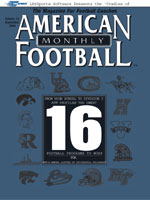AMERICAN FOOTBALL MONTHLY THE #1 RESOURCE FOR FOOTBALL COACHES
Article CategoriesAFM Magazine
|
Attention! Forward March!Fisher DeBerry, Bobby Ross and Paul Johnson Are Faced With a Military Challengeby: David Purdum © More from this issue No one is more excited about the upcoming season than Bobby Ross. And, yes, he knows all about his new team’s recent struggles. “I still have the energy so I might as well use it,” says the 67-year-old head coach, who received the nation’s longest losing streak as a welcome back gift. Ross became the 34th head football coach at the United States Military Academy in December. He returns to the sidelines after a four-year hiatus from coaching – 12 years out of the college game – to face possibly the biggest challenge of his illustrious career. Along with the 15-game slide, Ross inherits the nation’s worst rushing attack, attached to the 115th-ranked offense. The Black Knight defense wasn’t much better, ranking 111th. Last year’s winless campai....The full article can only be seen by subscribers. Subscribe today!
|
|
|||||||
| HOME |
MAGAZINE |
SUBSCRIBE | ONLINE COLUMNISTS | COACHING VIDEOS |
Copyright 2025, AmericanFootballMonthly.com
All Rights Reserved





